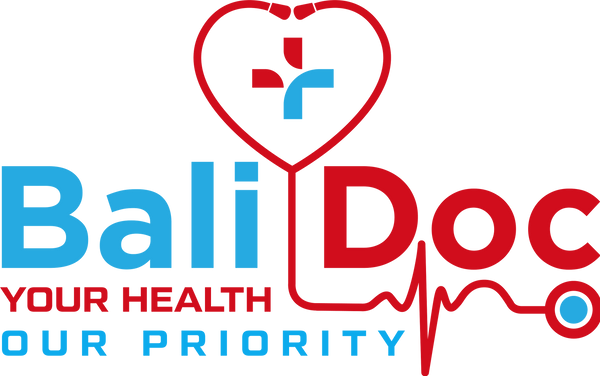
Staying Healthy in Bali: Common Tourist Health Concerns
A vacation that is meant to be enjoyable may not go as planned if you get sick. Prevention or treatment is still possible to cure certain diseases if a person is already infected. Regarding what diseases are in Bali, the following are some diseases that are prone to spread in Bali:
Typhoid Fever
Typhoid fever is one of the illnesses that can occur in Bali; it is caused by the salmonella bacteria Salmonella typhi. Water or food that has been contaminated can spread the salmonella bacteria. It's possible for someone to be unaware that they have this illness and that they can spread it to others. Symptoms of this illness include fever, aches and pains in the muscles, nausea, diarrhea, and other digestive issues. A typhoid vaccination is advised because Bali is regarded as a high-risk area. Getting vaccinated is highly advised if you intend to travel for longer than six weeks or stay in small towns and remote areas. If you plan to purchase food from street vendors, vaccination is also advised. However, immunization is not required if visitors only intend to spend a short time in Bali and only eat and drink at hotels and resorts.
Hepatitis A
Travelers visiting developing nations like Indonesia and Bali are advised to get vaccinated against hepatitis A. After diarrhea, hepatitis A is one of the most common travel diseases and can be found in Bali. It is a liver infection. It is typically spread by tainted food and drink, much like typhoid. Direct contact between contaminated individuals and others can also spread this disease. For example, if an infected farmer handles your food, then the food will most likely be contaminated as well. Hepatitis A frequently manifests as fever, nausea, vomiting, and abdominal pain. Rarely, this illness may cause significant liver damage.
Malaria
Malaria is one of the illnesses that exist in Bali. It is deemed low risk since there is little chance of contracting malaria while visiting Bali. However, receiving malaria prophylaxis may be worthwhile if you intend to spend a lot of time in rural areas or hike mountains frequently. Unfortunately, there is no vaccine against malaria. Avoiding mosquito bites and wearing long sleeves and long pants when hiking are the best ways to avoid it.
Dengue Fever
Bali is home to a large number of dengue fever cases. A few specific mosquitoes can bite a person and spread the high-risk disease dengue fever. This disease is spread by the Aedes mosquito, and it usually happens during the day. Fever, aches in the
joints and muscles, nausea, vomiting fits, and excruciating headaches are typical symptoms. A smaller number of people with dengue will have severe disease. Severe dengue is a medical emergency, requiring immediate medical attention at a hospital. Hospitalization with dengue is most common in older children and adolescents. Warning signs of severe dengue begin 12 to 24 hours after fever goes away and include stomach pain and tenderness, vomiting, bleeding from the nose or gums, blood in vomit or stool, and extreme tiredness or restlessness.
Dengue fever typically is a self-limiting disease with a mortality rate of less than 1%. When treated, dengue hemorrhagic fever has a mortality rate of 2-5%. When left untreated, dengue hemorrhagic fever has a mortality rate as high as 50%. To ensure that it is handled properly, make sure you discuss with your doctor. QDENGA is the only dengue vaccine approved in Indonesia for use in individuals regardless of previous dengue exposure and without the need for pre-vaccination testing.
Diarrhea or Bali Belly
Bali Belly is the most common disease in Bali. It is a word used to describe diarrhoea and other stomach issues. In Bali, it frequently attacks foreign visitors and travelers. During your trip, this illness could strike at any point. Food and water tainted with bacteria, including salmonella, escherichia coli, and shigella s, are the cause of Bali Belly. The two main things that lead to Bali Belly are drinking tap water and eating food from street vendors. This is brought on by unhygienic conditions and a humid environment, which accelerates the growth of bacteria in food. Fever, cramping in the stomach, vomiting, diarrhea, and occasionally blood in the stool are the first signs of Bali Belly. The symptoms range from mild to moderate.
Dehydration may result from the aftermath since you lose several liters of water over the course of several days. Make light and gentle food choices, such as toast, rice, and bananas, to soothe your stomach. Probiotics can also be beneficial as they aid in the restoration of beneficial bacteria in your digestive system. Obtain over-the-counter medications to help you feel better in the short term. When self-resolving symptoms do not improve, a microbiologic stool test should be ordered. By doing so, the physician can more accurately prescribe a course of action and gain a better understanding of any bacterial pathogens that may be present.
Rabies
Rabies is a rapidly progressing virus that causes death. It is almost always spread by an animal bite but can also be spread when a rabid animal’s saliva gets directly into the eyes, nose, mouth, or broken skin. The primary sources of human infection worldwide are dogs and certain wildlife species, such as foxes, raccoons, mongooses, and bats. Rabies can be prevented with a vaccine. There are human rabies vaccinations available for pre-exposure immunization. Pre-exposure vaccination is also advised for visitors to isolated, rabies-affected areas who intend to spend a significant amount of time outdoors engaging in outdoor activities like mountain climbing or caving. See a doctor if you've been bitten or scratched to find out if you have a higher risk of rabies or other illnesses. As soon as you are bitten or scratched, wash the area thoroughly for at least ten to fifteen minutes using soap and
water. At this point, it's also advised to apply an iodine solution to the wound; this first aid wound care is essential and can save lives. Visit your local healthcare provider next to find out if you require the post-exposure prophylaxis (PEP) vaccine.
